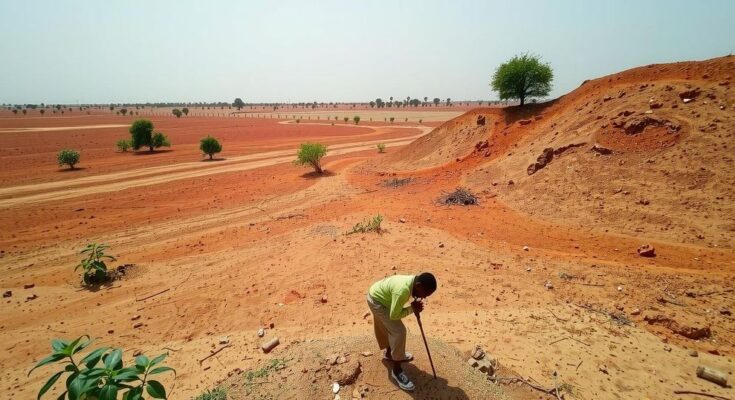Research reveals that Northwest Ghana is experiencing significant climate change, leading to increased migration south. This was reported during a graduation ceremony for participants in the REACH-STR project, which seeks to address gaps in climate change, migration, and gender policies. Notable figures highlighted the importance of these findings for future development strategies and inclusive climate interventions.
Research findings indicate that Northwest Ghana is facing severe climate change effects compared to other regions, leading to increased migration toward the south. This conclusion emerged from studies involving 14 Master’s students and four PhD candidates, showcasing the need for local residents to migrate as a primary response to climate impacts. The results were presented during a graduation event for 18 scholarship beneficiaries of the REACH-STR project, funded by the European Union and the International Water Management Institute (IWMI).
The research targeted communities in the Upper West and Savannah Regions, aiming to address significant policy and development gaps concerning climate change, migration, and gender issues. Dr. Birhanu Zemadim Birhanu, Deputy Country Representative at IWMI, highlighted the necessity of documenting social transformations in the north and how the findings could support inclusive climate interventions. He emphasized fostering dialogue about these crucial insights to inform future development strategies.
Dr. Zemadim characterized the graduation as a significant achievement for the scholars, equipping them to tackle the intertwined challenges of climate change, migration, and gender disparities in vulnerable populations. The event, themed “Building Capacity of the Next Generation for Climate-Resilient Development,” underlined the project’s commitment to advancing institutional capabilities and promoting sustainable practices in Northwestern Ghana.
Massimo Mina, Head of EU Cooperation, urged the government to consider these findings in future climate policy initiatives, recognizing their potential to enhance community resilience against climate vulnerabilities. Prior to the graduation, participants had discussions with EU Ambassador to Ghana, Mr. Irchad Razaaly, who commended their vital contributions to climate resilience efforts.
Beneficiaries of the project, studying at various institutions, shared their transformative experiences and expressed newfound capabilities to address climate change impacts in the north.
The REACH-STR project, initiated in February 2019 and set to conclude this year, is a €2.3 million EU-funded initiative designed to generate knowledge for sustainable rural development, climate adaptation, and migration, implemented across the Upper West and Savannah Regions.
In conclusion, the research emerging from the REACH-STR project has illuminated the severe climate changes afflicting Northwest Ghana, prompting migration as a viable escape for residents. The findings have underscored the necessity for informed climate policies that integrate the experiences and needs of vulnerable communities. Ultimately, this initiative fosters dialogue and equips scholars to develop sustainable strategies in addressing the pressing challenges of climate resilience and social transformation in the region.
Original Source: www.gbcghanaonline.com




